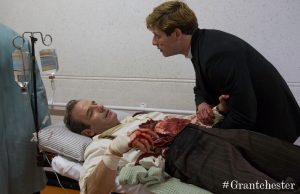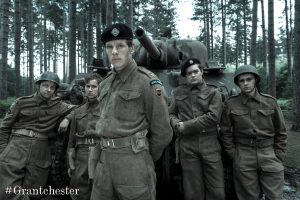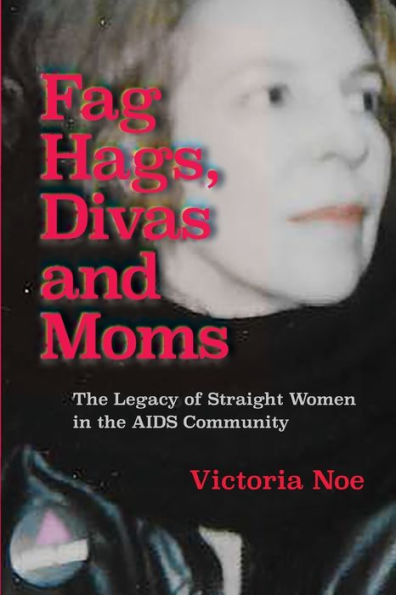Friend Grief and Grantchester
Jun 28, 2016 by Victoria Noe, in Friend Grief and the Military
, Friendship
, Grantchester
, military
, Military Outreach USA
, moral injury
, veterans
[caption id="attachment_1441" align="alignleft" width="202"] pbs.org[/caption]
pbs.org[/caption]
I’m a big fan of British period mysteries, and given the harsh reality of the news the past two weeks, I admit to a bit of escapism.
Grantchester is a traditional mystery series – based on the novels by James Runcie – set in the real-life town of Grantchester in Cambridgeshire eight years after the end of World War II. The stories revolve around the vicar, Sidney Chambers (played by James Norton) and his mate, grumpy police inspector Geordie Keating (played by Robson Green). They are supported by a memorable group of characters – Sidney’s assistant, his housekeeper, the girl-who-got-away, and others. The richness of the characters is what has kept me a fan through its three seasons on PBS.
The first season finale digs deep into Sidney’s personal demons: not just the woman he loved and lost, but the trauma of war. When two men who served in the same squad are murdered, and their former commanding officer suspiciously uncooperative, Sidney and Geordie vow to find the truth.
[caption id="attachment_1442" align="alignleft" width="207"] pbs.org[/caption]
pbs.org[/caption]
The body count continues: Geordie is gravely wounded when they search an empty factory for clues, and a third man from the squad kills himself in front of Sidney. Each successive violent incident, including Sidney’s inability to convince the third man to forgive himself, triggers flashbacks in Sidney: flashbacks to his own war trauma.
What happened to that squad – and separately to Sidney – was moral injury, something I wrote about in Friend Grief and the Military: Band of Friends. It’s what happens when you do something against your conscience. Maybe you feel you should’ve been able to stop something bad from happening. Maybe you feel guilty for being alive when those you served with are dead. Maybe you were forced to do something you knew was wrong.
In the case of the squad, they were ordered to unnecessarily kill Germans who were already captured and no threat to them. On their refusal, their squad leader did the deed. For Sidney, his own mistake led to the death of a man under his command (though the truth is much more devastating).
The guilt of what happened to the squad led to the murders and suicide. Geordie’s near-death eerily echoed the death of Sidney’s young soldier.
As I said, the story takes place in 1953. These men have had eight long years to grieve, to suffer, to blame themselves. They drank too much, drove too fast, slept with women they didn’t care about. No amount of penance could erase their guilt.
[caption id="attachment_1443" align="alignleft" width="200"] pbs.org[/caption]
pbs.org[/caption]
“We live in the shadow of it, “Sidney admits. “All of us.”
They punish themselves and do so in isolation. They don’t discuss what drove them to despair because their shame is too overwhelming. Sidney’s assistant and housekeeper reach out to him, offering their willingness to listen, to help him with the case (which they do, hilariously), to support him any way they can. But Sidney – like the men in that squad – doesn’t feel worthy of their love.
No spoilers here. You’ll have to watch the show yourself. But it won’t surprise anyone to learn that unlike other plot devices, Sidney’s moral injury isn’t “fixed” in one episode. The moral injury suffered by men and women in real life isn’t quickly or easily addressed either.
But if you want to learn more, and how you can make a difference, Military Outreach USA can help.
 pbs.org[/caption]
pbs.org[/caption]I’m a big fan of British period mysteries, and given the harsh reality of the news the past two weeks, I admit to a bit of escapism.
Grantchester is a traditional mystery series – based on the novels by James Runcie – set in the real-life town of Grantchester in Cambridgeshire eight years after the end of World War II. The stories revolve around the vicar, Sidney Chambers (played by James Norton) and his mate, grumpy police inspector Geordie Keating (played by Robson Green). They are supported by a memorable group of characters – Sidney’s assistant, his housekeeper, the girl-who-got-away, and others. The richness of the characters is what has kept me a fan through its three seasons on PBS.
The first season finale digs deep into Sidney’s personal demons: not just the woman he loved and lost, but the trauma of war. When two men who served in the same squad are murdered, and their former commanding officer suspiciously uncooperative, Sidney and Geordie vow to find the truth.
[caption id="attachment_1442" align="alignleft" width="207"]
 pbs.org[/caption]
pbs.org[/caption]The body count continues: Geordie is gravely wounded when they search an empty factory for clues, and a third man from the squad kills himself in front of Sidney. Each successive violent incident, including Sidney’s inability to convince the third man to forgive himself, triggers flashbacks in Sidney: flashbacks to his own war trauma.
What happened to that squad – and separately to Sidney – was moral injury, something I wrote about in Friend Grief and the Military: Band of Friends. It’s what happens when you do something against your conscience. Maybe you feel you should’ve been able to stop something bad from happening. Maybe you feel guilty for being alive when those you served with are dead. Maybe you were forced to do something you knew was wrong.
In the case of the squad, they were ordered to unnecessarily kill Germans who were already captured and no threat to them. On their refusal, their squad leader did the deed. For Sidney, his own mistake led to the death of a man under his command (though the truth is much more devastating).
The guilt of what happened to the squad led to the murders and suicide. Geordie’s near-death eerily echoed the death of Sidney’s young soldier.
As I said, the story takes place in 1953. These men have had eight long years to grieve, to suffer, to blame themselves. They drank too much, drove too fast, slept with women they didn’t care about. No amount of penance could erase their guilt.
[caption id="attachment_1443" align="alignleft" width="200"]
 pbs.org[/caption]
pbs.org[/caption]“We live in the shadow of it, “Sidney admits. “All of us.”
They punish themselves and do so in isolation. They don’t discuss what drove them to despair because their shame is too overwhelming. Sidney’s assistant and housekeeper reach out to him, offering their willingness to listen, to help him with the case (which they do, hilariously), to support him any way they can. But Sidney – like the men in that squad – doesn’t feel worthy of their love.
No spoilers here. You’ll have to watch the show yourself. But it won’t surprise anyone to learn that unlike other plot devices, Sidney’s moral injury isn’t “fixed” in one episode. The moral injury suffered by men and women in real life isn’t quickly or easily addressed either.
But if you want to learn more, and how you can make a difference, Military Outreach USA can help.

